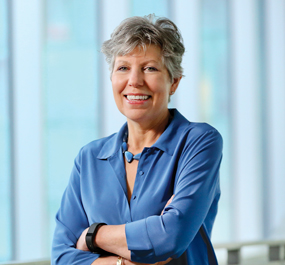Letter From the Editor

Mike Lovett
Laura Gardner, P’12
I met Lily Adams ’09 in 2007 when former President Bill Clinton came to campus to deliver the inaugural lecture for the newly established Eli J. and Phyllis N. Segal Citizen Leadership Program, which honors the work of the late Eli Segal ’64, who was committed to the goal of developing young leaders. Clinton spoke to an audience of thousands of rapt students, faculty and staff assembled at Gosman.
Adams, then a Brandeis sophomore, had been introduced to Bill and Hillary Clinton the year before, when they delivered eulogies at memorial events for her grandmother, former Texas Gov. Ann Richards. When I talked with Adams at the Clinton lecture, I didn’t know about her political lineage or connections, but I was struck by her self-possession and maturity.
Fast-forward a decade and a half, and Adams is a calm behind-the-scenes force in the Democratic Party, a rising star whose resume includes stints working for a string of high-profile political leaders, including Richard Blumenthal, Tim Kaine and Kamala Harris.
As Julia M. Klein writes in our cover story, in an era of political vitriol, venom and vanity Adams exemplifies the work ethic of someone who’s drawn to core social-justice issues of race, gender and health care rather than the spotlight. You may not see her center stage all that much — though she hasn’t ruled out a run for political office — but you know she’ll play an impressive role in shaping the future of the Democratic Party.
Other Brandeisians featured in this issue are similarly focused on making an impact by pursuing goals larger than themselves and their personal gain. Take a close look at the images taken by wildlife photographer Mark Seth Lender ’71, MA’74, the explorer-in-residence at NPR’s “Living on Earth.” His photos are absolutely beautiful. But they are more than that.
As Lender told me, “Beautiful photos are incidental to my work. I value the beauty of the natural world because it draws us — we wouldn’t connect to it if it were ugly — but [the animals] are telling the story. I’m just writing it down.”
He treats his subjects as equals who are as fascinated by him as he is by them — “evidence of a deeper connection of the most important kind,” he writes. Through his work, he asks us to consider what happens to us if these creatures vanish from our shared world.
Psychologist Margie Lachman has spent her career studying the human animal. A scholar of healthy aging, she has helped redefine the life course through science, debunking myths like the midlife crisis and demonstrating that people can have more agency over aging than they might expect.
As winter gives way to spring and much, much needed renewal, I hope this issue helps you feel a bit more connected to Brandeis until our community is truly back together again. Stay well, and stay safe.
Best,
Laura Gardner, P’12
Editor-in-Chief
